About a week before Netflix released its 3 Body Problem adaptation on March 21st, I finished Death’s End, the final book of Cixin Liu’s original trilogy. I’ve been reading the series since before Christmas and, from the start, I was completely enthralled by the ideas presented in these best-selling Chinese novels.
The Remembrance of Earth’s Past trilogy, as it is officially titled, is hard sci-fi like we haven’t seen on the screen in quite some time. The ideas that Cixin Liu explores in his story are ambitious and far-reaching, involving complicated tech, speculative science, and convoluted time-jumps that imagine centuries of progress and societal change within a few hundred pages.
Given the nature of Liu’s story, I was interested to see how the Netflix adaptation would manage the challenge of translating these books to the screen. And, after watching the full series, I was quite impressed with the overall effort.
This is certainly a flawed adaptation — the books themselves are flawed in many ways — but I think they preserve the awe-inspiring element of Liu’s ideas, while navigating the difficulties of telling the story for a broader TV audience.
In this blog, I want to talk through some of the things that I found interesting about the adaptation: how it shifts the cultural setting, how it deals with the original characters, and how it preserves the core ideas. Hopefully you’ll enjoy my thoughts on the subject!
Please note that the rest of this blog will contain spoilers for Netflix’s 3 Body Problem show and some spoilers for Cixin Liu’s original trilogy as well. Read at your own discretion.
Table of Contents
The Show-Runners
Any discussion of the 3 Body Problem adaptation would be remiss if it did not start with who Netflix has chosen to lead this ambitious project: David Benioff and D.B. Weiss, the now-infamous showrunners for Game of Thrones.
While I will forever nurse a grudge against these two for the mess they made of the ending of Game of Thrones, people often forget the true excellence of the earlier seasons. There is no question that Benioff and Weiss are great adapters and, fortunately, Liu’s series is complete, so there is less danger of them having to write original material.
Coupled with the fact that Remembrance of Earth’s Past is only three books and I think the risks of this show jumping the shark in the later seasons will be low. I don’t expect 3 Body Problem to be longer than 3 seasons, although it’s possible they may split one of the later books into two parts (they are quite convoluted).
When we look at Benioff and Weiss’ failures on Game of Thrones, it’s clear that caving to pressure to wrap the show was part of the problem. With 3 Body Problem, again, we don’t have the issue with length — but we do see the adaptation trending in more audience-friendly directions. I don’t think this is necessarily a ‘bad thing’, but it is something I want to discuss more below.
Overall, my verdict is that Benioff and Weiss have an opportunity to redeem themselves somewhat for Game of Thrones with this show. They haven’t knocked it out of the park yet, but this is certainly a good start. So I’ll be interested to see if they run into any old pitfalls when writing later seasons, i.e. deviating from source material or caving to pressure from producers.
Cultural Differences Between Original and Adaptation
So let’s get to the show itself. The first thing to mention is that there is a significant shift in setting between Liu’s books and the Netflix show.
In the original trilogy, most of the story takes place in China and centres on Chinese characters, especially in The Three-Body Problem (Book 1). For the Netflix adaptation, a large part of the action has been shifted to England and revolves around the Oxford Five, a group of friends who studied physics together at Oxford University.
This shift makes a lot of sense for Western audiences and I think it was a good choice overall, apart from some specifics of its execution. In press releases, the showrunners have mentioned this was done to make the show more “global”, which is an interesting way of framing it.
In the later books, Liu does introduce many more non-Chinese characters, especially as time-jumps make national divisions less relevant, so the above comment feels a bit disingenuous. That said, it is a culturally Chinese book at heart and I appreciate that Netflix has attempted to preserve this by keeping characters like Ye Wenjie and Da Shi (Clarence) mostly unchanged and also casting a Chinese actress, Jess Hong, in what is ostensibly the lead role.
The Optics of the Cultural Revolution Backstory
One issue with the shift of the present day storyline to the West, while keeping the Ye Wenjie backstory in the Cultural Revolution era, is that it does play oddly for Western viewers. The juxtaposition of the two storylines makes the show feel a lot like anti-CCP propaganda and this has caused some outcry in Chinese, from what I’ve read online.
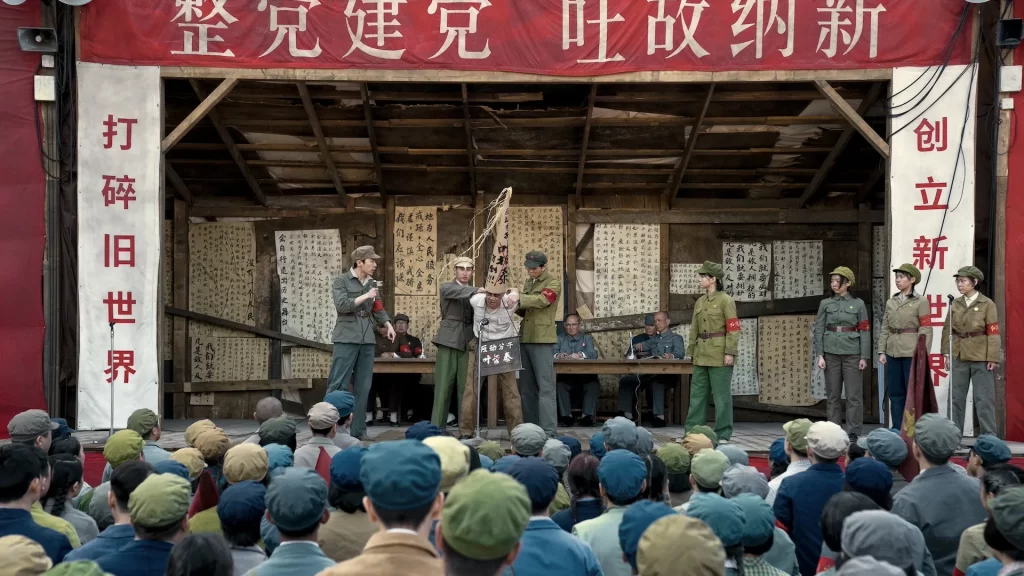
I was honestly shocked when I first read the opening Cultural Revolution scenes in The Three-Body Problem because I couldn’t believe the CCP would allow something like this to be published. In a way, it changed my perspective on censorship in China, since the Ye Wenjie backstory is so overtly critical of what happened in the Cultural Revolution. It couldn’t have been published if that part of Chinese revolutionary history was being fully suppressed (Note: I have heard that parts of the original novel were shifted around by censors to not start with the Cultural Revolution scenes).
I think there is a risk that casual viewers will take a simplistic message from the way the two plotlines are juxtaposed (China bad, West good), which isn’t what Liu intended. So I understand the outrage, even if I also understand the reasons for shifting the main storyline into a Western setting, but keeping the Chinese antagonist.
What I will say about the change is that the primary storyline doesn’t lose much being transplanted to England. There was nothing particularly distinct about its original setting in modern China and there were even elements of the story that are better off removed…
Sexism in the Original Trilogy
A lot of ink has already been spilled over the whole Luo Ji plotline in The Dark Forest, where he asks Da Shi to find his imaginary waifu dream-girl, who he’s been fantasizing about for years. This whole section of the novel is honestly incredibly dull, turning into what feels more like wish fulfillment for the author than anything resembling character development.
There was also a good post on Reddit recently, going over differences in translation between the Chinese original and the English versions from Ken Liu and Joel Martinsen. Basically, it seems like there were a lot more issues with how female characters were written and even blatant sexual objectification of women in the original books, which was taken out in the translations.
Anyone who has lived or travelled extensively in Asia will know that this part of the world can still be a few decades behind the West when it comes to standards for sexism, misogyny, and other gender issues. I spent a year living and working in Japan, back in 2013, and I was pretty shocked by some of what I saw there (and I am a cis white man). So I can’t say I’m surprised to hear this about Liu’s original.
There is no question that the books (even the English translations) have significant issues with their portrayal of women, especially from a Western perspective. So I think the Netflix adaptation has unquestionably improved the story in this regard.
This also segues us into one of the most important points of discussion for the series: if female characters are written poorly, it’s primarily because all characters are written poorly in Liu’s originals. And that’s a major challenge that the adaptation has to grapple with…
The Issue of Character
When reading Liu’s original trilogy, I was frequently struck by how flat the characters were — they displayed little individuality, few personal idiosyncrasies, and you did not get a clear sense of interiority for most of them. Everything that was communicated about the characters was designed to further advance the plot or create world-building context (for the most part).
When we do get a sense of individual motivations for specific characters, it typically ties into a broader social commentary that Liu wants to make or serves to illustrate some fundamental aspect of human nature (from his perspective). This approach can be interesting, but it’s more like reading a historical account than a fictional narrative at times.
I’m not familiar enough with contemporary Chinese literature to know whether this type of shallow characterization is a cultural tendency (i.e. de-emphasizing individuality in a communist society) or something specific to Liu. Certainly, it is the type of issue that we will see with older hard sci-fi stories in the West, where the focus is on plot and world-building, rather than character development.
So it’s clear these characters were never going to make it into a Western show unchanged. The question is whether the show has made a noticeable improvement.
The Oxford Five — Good or Bad Decision?
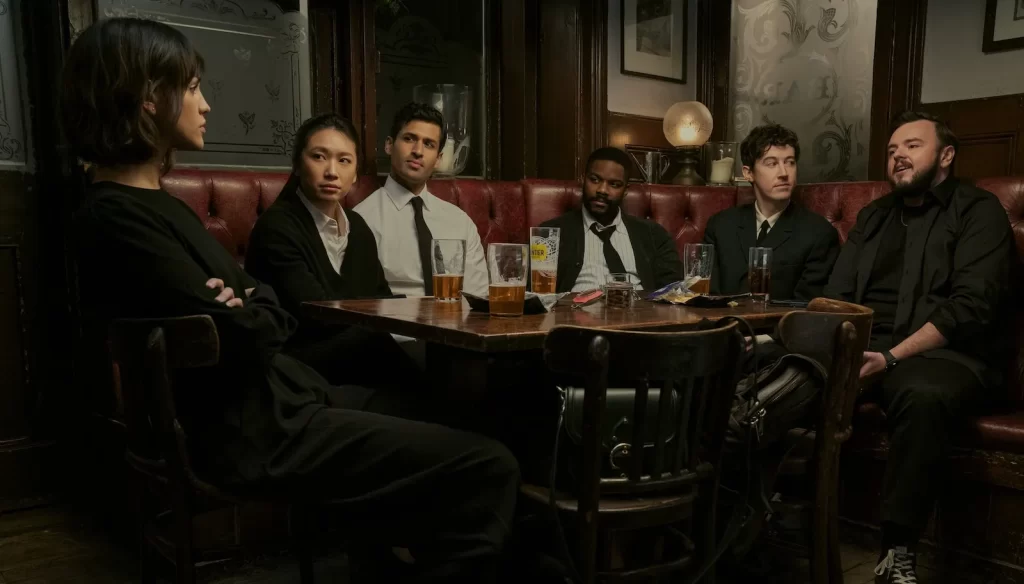 Overall, I like how the show chose to mix some characters together when creating the Oxford Five, but I think they could’ve reduced the size of the group and given themselves more space to flesh out the key characters in detail. For future reference, here is how the Oxford Five seems to line up with the original characters:
Overall, I like how the show chose to mix some characters together when creating the Oxford Five, but I think they could’ve reduced the size of the group and given themselves more space to flesh out the key characters in detail. For future reference, here is how the Oxford Five seems to line up with the original characters:
- Jin Cheng = Cheng Xin / Wang Miao
- Auggie Salazar = Wang Miao / AA (?)
- Will Downing = Yun Tianming
- Jack Rooney = Hu Wen
- Saul Durang = Luo Ji
But let’s leave them aside for the moment and talk about characters more broadly. In the books, one of the best characters is Ye Wenjie. She’s got a strong, well-developed backstory in the Cultural Revolution and that makes her a fascinating villain, alongside Mike Evans. I was really happy to see the show preserve her story unchanged for the most part.
Unfortunately, the others don’t have the same depth to their backstories. Wang Miao and even Cheng Xin are pretty thin characters in the book. The show fills in some gaps, with them going to university together, but there’s not much else — no idea of what past trauma makes them tick or motivates their decision-making. The closest we have to a developed backstory is the unrequited crush that Will nurses on Jin, and that’s not saying much.
Ultimately, the show falls back on surface-level tropes to explore the relationships between the characters: they want to sleep with each other (Will with Jin, Saul with Auggie), they support each other through cancer (Will and everyone), or they get into arguments about the ethics of what they’re doing (Jin and Auggie, Jin and Raj).
At the end of the day, this stems from an issue with the source material. The adaptation tries to add more depth to the characters, but there isn’t really room in the show to build it up.
One common complaint that I’ve seen online is that by mashing all these characters into the Oxford Five and putting them in the same place, it makes the show feel narrower, instead of more “global”. I don’t disagree with this take, but I also see the showrunners’ reason for doing it.
Creating the Oxford Five allows the show to explore these characters together and not introduce an extraneous supporting cast, whose only purpose would be to help us learn about the protagonists. It does give the show the feel of a sitcom at the beginning, which may create the wrong expectations for viewers, but it is an economical tool for introducing the protagonists and getting into the meat of the story.
The risk of separating these characters was that the characters would feel even more shallow and under-developed. That said, I do think there was an opportunity to boil the core group down to just three or four people and flesh them out in more detail:
- Jin Cheng = Cheng Xin / Wang Miao
- Will Downing = Yun Tianming
- Jack Rooney = Hu Wen
While I like Auggie and Saul as characters, I think the only characters that you need for the first season are these three. Maybe keep Auggie to provide a foil for Jin, since the two have very different orientations about what’s going on.
Ultimately, there are a lot of things that could have been done differently. I don’t think the Oxford Five was a bad idea, it was an economical decision for the story, even if it does make things feel a bit forced at the beginning. But it’s also worth discussing how individual storylines were handled.
Breaking Down the Oxford Five
There’s a lot to go over with the individual members of the Oxford Five — some good and some not-so-good. So let’s dive into some of the bigger issues with these new characters, before we take a look at what the show got right.
What’s Up with Cancer Boy?
One of the major changes in the adaptation is shifting the Yun Tianming-Cheng Xin storyline from The Dark Forest (Book 2) into the first season of 3 Body Problem. The reason for this change is that the timelines line up better and I believe it’s a smart decision overall. However, the Yun Tianming story (prior to euthanasia and being launched as a brain into space) is relatively short, whereas Will’s story really drags throughout this first season.
I’ve seen some criticism of the Will storyline online, discussing how Will’s character feels unsympathetic in his unrequited love and a bit ‘one note’ with the cancer situation. There are certainly a lot of scenes with Will talking to Jack or Saul or Auggie about his cancer. The storyline holds a lot of emotional weight in the broader narrative and it’s probably necessary for believability, but it steals a ton of screen time from other plotlines.
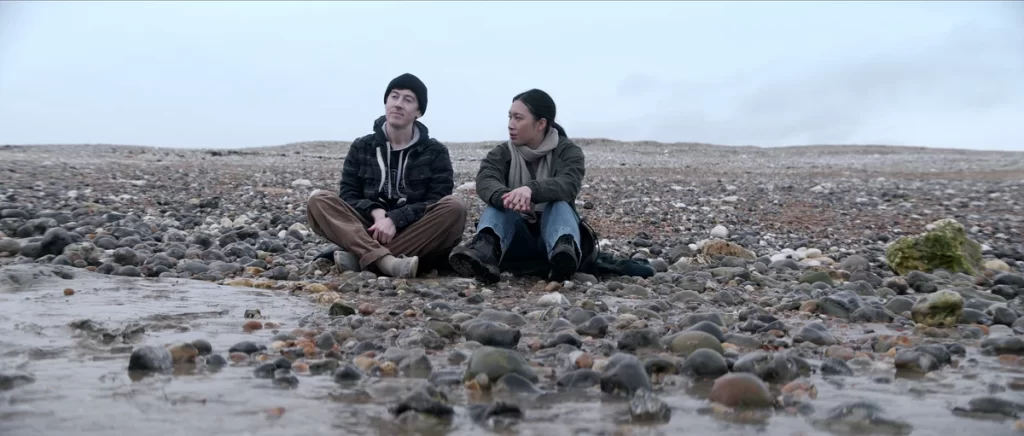
I don’t think the people commenting online have it wrong when it comes to Will’s character. In the books, Yun Tianming is a loser and social outcast. He’s deeply unsympathetic and it’s a pretty odd decision by Liu to give his story so much weight, if we’re being honest — and I’m not entirely sure I understand why he does it. Trying to appeal to a reader base of shut-ins?
If anything, the show makes Will more sympathetic than Yun Tianming by portraying him as a teacher and giving his relationship with Jin a bit more credibility (a shared history). By contrast, in the books, Yun Tianming is basically just Cheng Xin’s stalker.
I think the show could’ve done more to make Will sympathetic and make us root for the Jin-Will romance, but I actually think this is a pretty faithful adaptation. We’re not really supposed to be rooting for Will / Yun Tianming to get the girl. That’s part of the pathos of his storyline.
Why Does Saul Become a Wallfacer?
Another plotline that was moved from The Dark Forest into the first season of 3 Body Problem is the Saul / Luo Ji Wallfacer plot. Again, I understand why this was done. If we don’t see Saul become a Wallfacer in Season 1, he feels pointless as a character. We’ve been waiting all season to see what he’s going to do (if you’ve read the books, you might have been able to guess), so there needs to be a payoff.
Again, this is something that I’ve seen people criticizing online, arguing that this storyline comes out of left field and I think there’s some validity to that. Many people will miss the hint embedded in his cemetery conversation with Ye Wenjie (it’s more subtle than the books), so I think the show could’ve set up some red herring to explain his involvement.
In the books, this setup also comes at the beginning of The Dark Forest, so we have several hundred pages to build up to the payoff moment when Luo Ji figures out the dark forest hypothesis (spoiler warning: if you haven’t read the books, don’t look this up). In the show, we’re just kind of left hanging as we wait for Season 2.
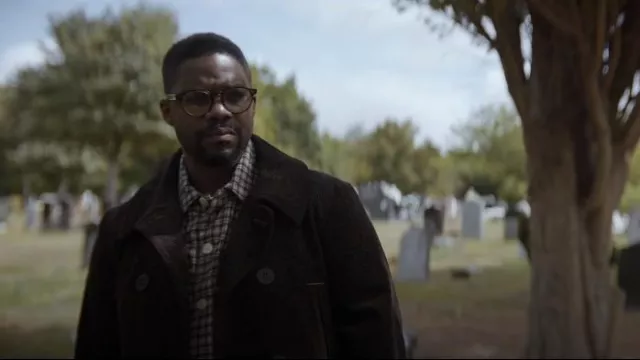
Hopefully the Saul storyline will deliver a satisfying payoff in Season 2. That’s certainly what I’m expecting the showrunners to do, but I feel like it created an odd ending for the first season.
This is one place where I think the Oxford Five decision created an issue for the adaptation. If Saul wasn’t part of the Oxford Five, he could simply be introduced as a character at the start of Season 2. But it would have been tricky perhaps to go back and work in his conversation with Ye Wenjie / Ding Yi or some other character to plant the seed for the dark forest to grow. So again, I understand the decision even if I don’t entirely agree with it.
Jin and Auggie Mixing Up Existing Characters’ Roles
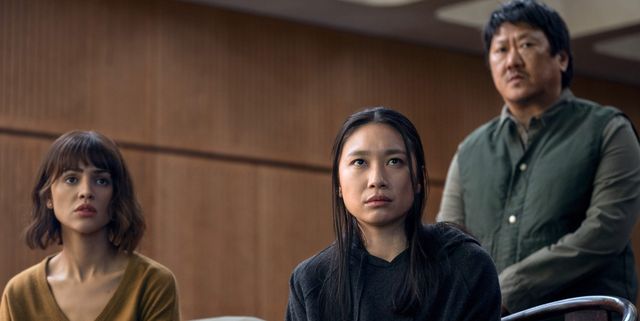
When it comes to things that I like about the show, the way the characters of Jin and Auggie were handled is one of the stronger elements. First, I think it was a great decision to introduce Cheng Xin’s character (Jin) at this early stage of the show rather than waiting until Season 2. For better or worse, the protagonist of the first book (Wang Miao) is a very forgettable character without much real depth. So it is nice to see the show centered on a more interesting protagonist from the get-go.
While Auggie is nominally based on Wang Miao, she doesn’t share many characteristics in common with him — other than her specialization in nanomaterials and general skepticism. There is a great dynamic between Jin and Auggie, where Jin is idealistically bought into what’s happening and Auggie is quite cynical and skeptical of everything. Their later ethical disagreements fuel some of the better interactions between the members of the Oxford Five. I’m invested in this debate because what Auggie’s tech does to the freighter is truly horrifying and I understand her position. Conversely, I also relate to Jin’s desire to do something that will make a difference (with the probe). This isn’t a one-sided argument, by any means!
In addition, having Cheng Xin be the one to enter the 3 Body game (as Jin) takes over the role from Wang Miao’s character in the books, but this makes far more sense given her longer trajectory as a character. So overall, I don’t have many complaints here. I am curious what role Auggie will play in Season 2 (many people are speculating that she will take on the role of AA, adapted), but I think it’s possible that the showrunners may do something else. Either way, I would be shocked if she didn’t continue to have a major part to play.
Jack Rooney — Making a Forgettable Character Memorable
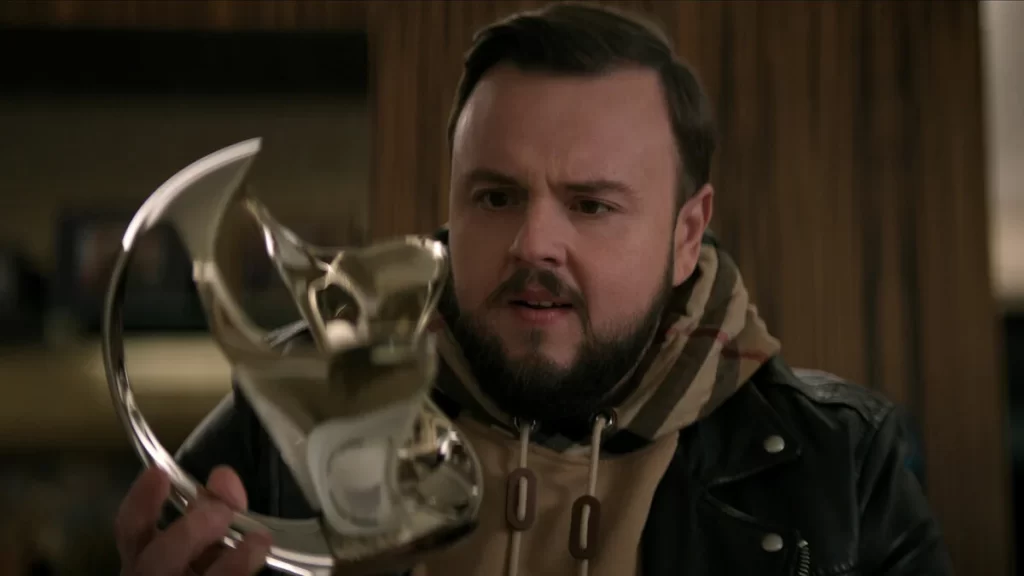
I don’t have a ton to say about Jack Rooney’s character. I thought he was great, he brought much-needed moments of comic relief and he served as a good foil for a number of different characters (Will with his cancer, Jin in the 3 Body game, Auggie’s seriousness, etc.). The character whose role he takes over from the books is even more forgettable than Wang Miao, so this is a massive improvement in my eyes. There are even nice little touches like him being a Man City fan (much as I hate City, this is a good detail that brings him to life).
If anything, I was sad to see him go as I think the latter half of the season was missing some of his comedic energy (I know some people found this cheesy, but it wasn’t an issue in my eyes). It does make sense for him to be the sacrifice that ups the stakes of the situation — and pushes the show towards an even darker note.
Being Faithful to the Core Ideas
In general, I feel like the show did an excellent job of replicating the rich world-building of the original books. We get all the cool ideas from the first book (and some from the second):
- The three-body video game
- The invisible countdown clock
- The blinking universe
- The sophons
- The nanofiber attack on the tanker
- The brain being accelerated with nukes
- The Wallfacer position
Most of these ideas are represented quite faithfully and I think this is a real strength of the adaptation. Hollywood has a tendency towards being flashy and simplifying concepts for mainstream audiences, which can lead to logical inconsistencies, and I think this show avoids this trap for the most part.
When Will’s Brain Goes Off Track
One of my biggest quibbles was the climactic scene where Jin and the rest launch Will’s brain into space. In this scene, the broken cable happens almost immediately. The implications for the flight trajectory and speed of the probe are enormous — if you understand even rudimentary physics, you know it’s going to be way too slow and going in completely the wrong direction.
By contrast, in the books, the cable doesn’t snap until the probe is well into its sequence. This means the deviation is only minor, although enough to miss the San-Ti / Trisolaran fleet. For some reason, this change really bothered me because it does break the physics logic of the original scenario, although I’m sure the show will hand-wave it away later.
It’s clear that the show wanted the cable-snap to happen earlier to provide more emotional punch (it would’ve been trickier to show the passage of time), but it just annoys me.
The Power Level of the Sophons
One place where I felt the show did get too flashy was the power level of the sophons, especially towards the later episodes when they’re known to everyone. There are a lot of impressive displays of sophon power in the books: the countdown, the interference with supercolliders, the blinking universe, the eye in the sky.
But what the book are careful to explain is that the sophons can’t really fuck with the physical world on Earth. All they can do is influence things on a subatomic level, producing illusions in our vision and potentially in electronics as well. They can’t hurt people directly, only trick them into hurting themselves or each other (like with the ETO).
The show kind of messes with this logic, especially after the eye in the sky scene. I can’t remember if the ‘You are bugs’ message shows up everywhere in the books, or just in the sky, but this was the first thing that felt a bit unrealistic. Then there’s the scene with Wade in his jet, when all the electronics fail and we think the plane is going to crash.
There’s an implication here that the sophons could just crash a bunch of jets/fuck with electronics and kill people at will, but this is specifically not something they’re able to do in the books. They can mess with certain electronics, but they can’t shortcircuit them, and they can’t create auditory illusions, only visual ones.
Introducing new powers to the sophons raises the question of why they’re not just killing people at will (like Saul / Luo Ji) and have to resort to pushing them to suicide or using proxies like the ETO. So I do think this is another potentially logic-breaking change that could’ve been avoided.